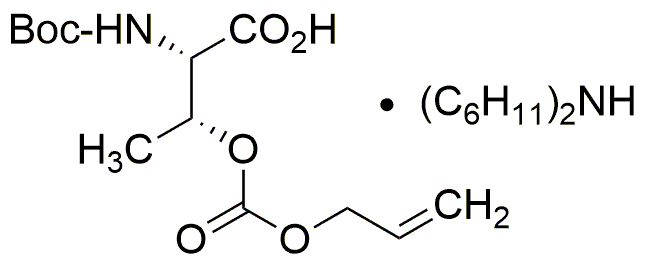Boc-O-allyloxycarbonyl-L-threonine dicyclohexylammonium salt is widely utilized in research focused on:
- Peptide Synthesis: This compound serves as a protective group in peptide synthesis, allowing for the selective modification of amino acids. It enhances the efficiency of synthesizing complex peptides, which are crucial in drug development.
- Bioconjugation: The compound is used in bioconjugation processes, where it helps attach biomolecules to surfaces or other molecules. This is particularly useful in creating targeted drug delivery systems in pharmaceuticals.
- Research in Drug Design: It plays a significant role in the design of new therapeutic agents by providing a versatile framework for the development of novel compounds, especially in the field of oncology.
- Protein Engineering: The compound aids in the modification of proteins, enhancing their stability and activity. This is beneficial in biotechnology applications, such as enzyme production and vaccine development.
- Analytical Chemistry: It is employed in analytical techniques to improve the detection and quantification of various biomolecules, facilitating better understanding and characterization of biological samples.
General Information
Properties
Safety and Regulations
Applications
Boc-O-allyloxycarbonyl-L-threonine dicyclohexylammonium salt is widely utilized in research focused on:
- Peptide Synthesis: This compound serves as a protective group in peptide synthesis, allowing for the selective modification of amino acids. It enhances the efficiency of synthesizing complex peptides, which are crucial in drug development.
- Bioconjugation: The compound is used in bioconjugation processes, where it helps attach biomolecules to surfaces or other molecules. This is particularly useful in creating targeted drug delivery systems in pharmaceuticals.
- Research in Drug Design: It plays a significant role in the design of new therapeutic agents by providing a versatile framework for the development of novel compounds, especially in the field of oncology.
- Protein Engineering: The compound aids in the modification of proteins, enhancing their stability and activity. This is beneficial in biotechnology applications, such as enzyme production and vaccine development.
- Analytical Chemistry: It is employed in analytical techniques to improve the detection and quantification of various biomolecules, facilitating better understanding and characterization of biological samples.
Documents
Safety Data Sheets (SDS)
The SDS provides comprehensive safety information on handling, storage, and disposal of the product.
Product Specification (PS)
The PS provides a comprehensive breakdown of the product’s properties, including chemical composition, physical state, purity, and storage requirements. It also details acceptable quality ranges and the product's intended applications.
Certificates of Analysis (COA)
Search for Certificates of Analysis (COA) by entering the products Lot Number. Lot and Batch Numbers can be found on a product’s label following the words ‘Lot’ or ‘Batch’.
*Catalog Number
*Lot Number
Certificates Of Origin (COO)
This COO confirms the country where the product was manufactured, and also details the materials and components used in it and whether it is derived from natural, synthetic, or other specific sources. This certificate may be required for customs, trade, and regulatory compliance.
*Catalog Number
*Lot Number
Safety Data Sheets (SDS)
The SDS provides comprehensive safety information on handling, storage, and disposal of the product.
DownloadProduct Specification (PS)
The PS provides a comprehensive breakdown of the product’s properties, including chemical composition, physical state, purity, and storage requirements. It also details acceptable quality ranges and the product's intended applications.
DownloadCertificates of Analysis (COA)
Search for Certificates of Analysis (COA) by entering the products Lot Number. Lot and Batch Numbers can be found on a product’s label following the words ‘Lot’ or ‘Batch’.
*Catalog Number
*Lot Number
Certificates Of Origin (COO)
This COO confirms the country where the product was manufactured, and also details the materials and components used in it and whether it is derived from natural, synthetic, or other specific sources. This certificate may be required for customs, trade, and regulatory compliance.

